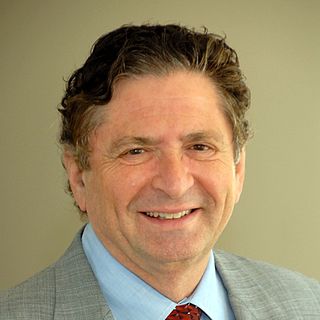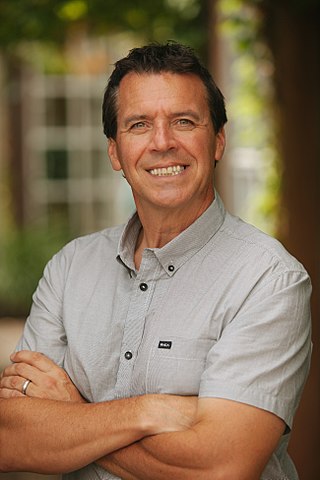Related Research Articles

Y Combinator Management, LLC (YC) is an American technology startup accelerator and venture capital firm launched in March 2005 which has been used to launch more than 4,000 companies. The accelerator program started in Boston and Mountain View, expanded to San Francisco in 2019, and was entirely online during the COVID-19 pandemic. Companies started via Y Combinator include Airbnb, Coinbase, Cruise, DoorDash, Dropbox, Instacart, Reddit, Stripe, and Twitch.

Robert Samuel Langer Jr. FREng is an American biotechnologist, businessman, chemical engineer, chemist, and inventor. He is one of the nine Institute Professors at the Massachusetts Institute of Technology.

Ivor Royston is an American oncologist, researcher, scientist, entrepreneur and venture capitalist, recognized for his efforts to develop treatments for multiple disease targets and to fund biotechnology companies with promising science, technology or medicines. He speaks regularly at healthcare conferences and symposia throughout the United States, Europe and Asia.
Christoph Westphal is an American biomedical businessman.
Alan Ashworth, FRS is a British molecular biologist, noted for his work on genes involved in cancer susceptibility. He is currently the President of the UCSF Helen Diller Family Comprehensive Cancer Center at the University of California, San Francisco, a multidisciplinary research and clinical care organisation that is one of the largest cancer centres in the Western United States. He was previously CEO of the Institute of Cancer Research (ICR) in London.
Michelle Dipp is an American scientist, businesswoman, and investor. She is the co-founder and a managing partner at Biospring Partners and serves on the board of Abzena and Kiniciti.
Startup accelerators, also known as seed accelerators, are fixed-term, cohort-based programs, that include mentorship and educational components, and culminate in a public pitch event or demo day. While traditional business incubators are often government-funded, generally take no equity, and rarely provide funding, accelerators can be either privately or publicly funded and cover a wide range of industries. Unlike business incubators, the application process for seed accelerators is open to anyone, but is highly competitive. There are specific accelerators, such as corporate accelerators, which are often subsidiaries or programs of larger corporations that act like seed accelerators.
Xconomy was a media company providing news on business, life sciences, and technology focusing on the regions of Boston, Boulder/Denver, Detroit, New York City, Raleigh-Durham, San Diego, San Francisco and Seattle. The website was launched in June 2007 by founders Robert Buderi and Rebecca Zacks. Xconomy content covered "local personalities, companies, and technological trends to business and technology leaders" with a target audience of "entrepreneurs, business and technology executives and innovators, venture capitalists, angel investors, lawyers, and university researchers and officials." Bill Mitchell of the Poynter Institute described Xconomy in 2010 as reflecting "the insiderish feel of, say, Politico, but with some of the familiarity that you might expect from a small town paper."
Science Exchange is a cloud-based software company offering an R&D marketplace to buy and sell scientific services. The marketplace gives life sciences companies access to the outsourced research they need and the platform fully automates R&D outsourcing from source to pay. Commercial contract research organizations (CROs) and academic core facilities can sell their products and services directly through the marketplace.

uBiome, Inc. was a biotechnology company based in San Francisco that developed technology to sequence the human microbiome. Founded in 2012, the company filed for bankruptcy in 2019 following an FBI raid in an investigation over possible insurance fraud involving the US health insurance program Medicare.
Lab Central, Inc., also known as LabCentral, is a non-profit organization started in November 2013. Operating over 225,000 sq. feet in Cambridge and on the Harvard University campus, LabCentral offers a network of fully permitted laboratory and office spaces for as many as 125 biotech start-ups comprising approximately 1000 scientists and entrepreneurs in the heart of Kendall Square. Additionally, LabCentral is committed to creating a more sustainable and inclusive biotech system supporting developments in STEM, workforce training, and next generation entrepreneurship through its LabCentral Ignite initiative. LabCentral is also home to Gallery 1832 which engages the local community to celebrate artistic innovation.
Ryan Bethencourt is an American scientist, entrepreneur, and biohacker best known for his work as co-founder and CEO of Wild Earth, Partner at Babel Ventures and cofounder and former Program Director at IndieBio, a biology accelerator and early stage seed fund. Bethencourt was head of life sciences at the XPRIZE foundation, a co-founder and CEO of Berkeley Biolabs, a biotech accelerator, and Halpin Neurosciences, an ALS therapeutics-focused biotech company. Bethencourt co-founded Counter Culture Labs, a citizen science nonprofit, and Sudo Room, a hacker space based in downtown Oakland, California.

Scientist.com is a network of public and private e-commerce marketplaces that connect buyers and sellers of scientific research services. The company was founded in 2007 by Kevin Lustig, Chris Petersen and Andrew Martin and launched its first public research marketplace in September 2008.

Kevin Donald Lustig is an American scientist and entrepreneur and founder of three life science companies: the pharmaceutical company Kalypsys in 2001; the online research marketplace Scientist.com in 2007; and the non-profit lab incubator Bio, Tech and Beyond in 2013.

Gregory L. Verdine is an American chemical biologist, biotech entrepreneur, venture capitalist and university professor. He is a founder of the field of chemical biology, which deals with the application of chemical techniques to biological systems. His work has focused on mechanisms of DNA repair and cell penetrability.

Ambika Bumb is an American biomedical scientist and a businesswoman. She is a nanomedicine specialist who uses nanotechnology for the detection and treatment of disease. Her discoveries using nanodiamonds while working as postdoctoral researcher at the National Cancer Institute and the National Heart, Lung, and Blood Institute led to the launch of the biotech Bikanta. Bumb is Deputy Executive Director at the Bipartisan Commission on Biodefense.
Mona Jhaveri is an American biotech scientist and entrepreneur notable for innovative approaches to cancer research, detection, and funding. From 2005 to 2010, she founded and ran Foligo Therapeutics Inc., a biotech startup that worked to develop and commercialize a DNA-based compound as a potential treatment for ovarian cancer. She is also the founder and executive director of Sound Affects, a nonprofit organization dedicated to improving financing for cancer research through collaboration with musicians.

Derrick J. Rossi, is a Canadian stem cell biologist and entrepreneur. He is a co-founder of the pharmaceutical company Moderna.
Anna Perdrix Rosell is a Spanish scientist who completed her PhD in cancer cell signalling at the Francis Crick Institute in London. She co-founded a biotech start-up, which helped her get onto the Forbes 30 under 30 list in 2018.
Abasi Ene-Obong, is a Nigerian biomedical scientist and entrepreneur. Abasi holds a master's degree in human molecular genetics from Imperial College London and a PhD in Cancer Biology from Barts and The London School of Medicine and Dentistry in England. Since September 2023, he is the founder and CEO of Syndicate Bio, a health technology company driving genomics and precision medicine initiatives in global healthcare. Prior to this, since 2019, Abasi served as the co-founder and CEO at 54Gene Inc, a defunct Nigerian health and biotech firm specialized in African genomics which he grew to a valuation of nearly $200m before stepping down in October 2022.
References
- 1 2 various (2012). "366 days: Nature's 10". Nature. 492 (7429): 335–343. Bibcode:2012Natur.492..335.. doi: 10.1038/492335a . ISSN 0028-0836. PMID 23257862.
- 1 2 Sharon Begley (August 14, 2012). "More trial, less error: An effort to improve scientific studies". Reuters. Retrieved December 27, 2012.[ dead link ]
- ↑ Jolie O'Dell (3 December 2011). Science: the New "Women's Work" (video). VentureBeat.
- ↑ "MixRank, Favo.rs, Science Exchange, Sprintly". Financial Post. December 7, 2011. Retrieved December 27, 2012.
- ↑ Bernadette Tansey (29 November 2012). "Science Exchange Creates a Trading Post for Research Services". Xconomy. Retrieved 17 December 2012.
- ↑ Ron Leuty (27 April 2012). "One-on-One With Science Exchange's Elizabeth Iorns". San Francisco Business Times. Retrieved 17 December 2012.
- 1 2 David Zax (3 April 2012). "Dropping Some Science: Scientists, Ditch The Academy and Become Entrepreneurs". Fast Company. Retrieved 17 December 2012.
- ↑ Iorns, Elizabeth Jane (2008). High Throughput Functional Analysis for the Identification of Breast Cancer Targets. jisc.ac.uk (PhD thesis). Institute of Cancer Research (University Of London). OCLC 1006087506. EThOS uk.bl.ethos.504787.
- ↑ "Young Investigator Awards". Expedition Inspiration Fund for Breast Cancer Research. 2011. Archived from the original on 18 February 2013. Retrieved 17 December 2012.
- ↑ "Search Results". PubMed.gov. Retrieved 17 December 2012.
- ↑ Carl Zimmer (August 14, 2012). "Good Scientist! You Get a Badge". Slate. Retrieved December 27, 2012.
- ↑ "Reproducibility Initiative to Increase the Value of Biomedical Research". Bio IT World. August 17, 2012. Retrieved December 27, 2012.
- ↑ Zoe Corbyn (19 August 2011). "An eBay for Science". Nature. Retrieved 17 December 2012.
- ↑ "2012 Kauffman Foundation Postdoctoral Entrepreneur Awards Recognize Entrepreneurship Excellence in Researchers". Ewing Marion Kauffman Foundation. 14 March 2012. Archived from the original on 15 April 2013. Retrieved 17 December 2012.
- ↑ Sam Altman (April 14, 2014). "Welcome Kat, Yuri, Patrick and Elizabeth" . Retrieved April 14, 2014.
- ↑ Richard Van Noorden (April 23, 2014). "Start-up investor bets on biotech". Nature. Retrieved November 11, 2014.
- ↑ Sarah Buhr (October 22, 2014). "SOSVentures Takes On Y Combinator With A Pure Biotech Accelerator". Techcrunch. Retrieved November 11, 2014.
- ↑ "Who Is Tech's Most Inspiring New Founder? SV Angel's Ron Conway, David Lee, And Brian Pokorny Name Names [TCTV]". TechCrunch. May 2, 2013. Retrieved June 11, 2013.
- ↑ "50 women who are changing the world". WIRED. June 7, 2013. Retrieved June 11, 2013.
- ↑ "How to Be Your Own Boss, According to 6 Awesome Female Entrepreneurs". Glamour. May 1, 2014. Retrieved November 11, 2014.